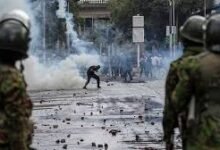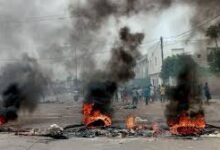Death toll rises to 22 in Nigeria building collapse

Two bodies were pulled out from the debris of a collapsed Lagos high-rise building on Wednesday bringing the death toll to 22 people.
Rescuers have brought to safety nine people who survived, the emergency services said, but construction workers feared dozens of their colleagues were trapped inside.
The 21-storey building was still under construction when it crumbled on Monday in the upscale Ikoyi neighbourhood of Nigeria’s commercial capital.
“We recovered two male bodies early this morning bringing the toll to 22,” Ibrahim Farinloye of the National Emergency Management Agency told AFP news agency.
Search-and-rescue operations entered the third day as hopes of finding more survivors appeared to dim.
“We won’t give up until we reach ground zero,” Farinloye said, adding bigger equipment was brought in on Tuesday for the operation.
Rescue workers had been communicating with other survivors still trapped under the destroyed building, while relatives and friends at the site await information on their fate.
Damilola Otunla, 29, sat on the pavement across the street pursuing a three-day vigil for her brother Bob-Oseni Wale, 50, believed to have been inside the high-rise when it collapsed.
She was angry with the slow pace of the daily rescue efforts on Wednesday, which resumed around 8:30am.
“It is like they have made their decision already,” she said.
Building collapses are common in Lagos and across Africa’s most populous nation, where substandard materials, negligence and a lack of enforcement of construction norms are major problems.
Two other smaller buildings in Lagos also collapsed on Tuesday following heavy rains in the densely populated city a day earlier, though no one was killed, Farinloye said.
Lagos state police said it is too early to determine why the Ikoyi building collapsed, but Lagos Emergency Management Agency manager Femi Oke-Osanyintolu said infractions had been committed in its construction.
“We are going to get to the roots of the matter to prevent a recurrence,” he said. -AFP






